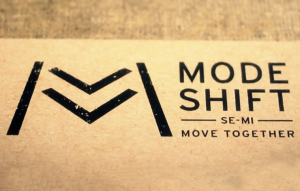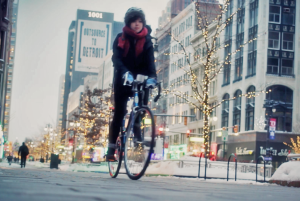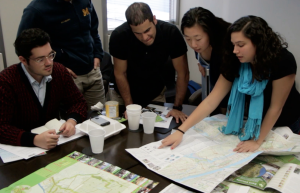Our second challenge this year was centered  around the topic of multi-modal transportation in Detroit. It was amazing partnering with Mode Shift: Move Together for this challenge. According to Jessica Soulliere, the non-profit’s program director and publication editor, Mode Shift is “a living, breathing online hub that both captures and accelerates quality of place choices that foster community connectedness in Southeast Michigan.” An important goal of the organization is to help make Detroit a more walkable and bikeable city. Our challenge was specifically targeted at improving the experience for bicyclers in the city.
around the topic of multi-modal transportation in Detroit. It was amazing partnering with Mode Shift: Move Together for this challenge. According to Jessica Soulliere, the non-profit’s program director and publication editor, Mode Shift is “a living, breathing online hub that both captures and accelerates quality of place choices that foster community connectedness in Southeast Michigan.” An important goal of the organization is to help make Detroit a more walkable and bikeable city. Our challenge was specifically targeted at improving the experience for bicyclers in the city.
Why is Bicycling Important for Detroit?
 Continued growth of the bicycling community can help play a significant role in the revitalization of Detroit because bicycling can contribute solutions to some of the city’s greatest challenges. For example, bicycling can help make our residents healthier. Did you know that riding a bicycle just 3 hours per week reduces the risk of heart disease and stroke by 50%? Additionally, adolescents who bicycle are 48% less likely to be overweight as adults. 47% of Americans say that they want more bike paths, lanes and trails in their community. Continued growth in Detroit’s bicycling infrastructure could help the city stabilize its population; maybe even help to grow it. Finally, bicycling can help Detroit with one of it its biggest challenge right now— the economy. Bicycling is a $81 billion a year industry when you factor in gear purchases and bicycle tourism. Even Wisconsin, with a climate similar to our own, has seen a boost to their annual economy of over half a billion dollars due to investments they’ve made in their bicycling infrastructure. (Find these and many more stats on bicycling here.) Surely fostering a community such as this in the city of Detroit could reap large benefits.
Continued growth of the bicycling community can help play a significant role in the revitalization of Detroit because bicycling can contribute solutions to some of the city’s greatest challenges. For example, bicycling can help make our residents healthier. Did you know that riding a bicycle just 3 hours per week reduces the risk of heart disease and stroke by 50%? Additionally, adolescents who bicycle are 48% less likely to be overweight as adults. 47% of Americans say that they want more bike paths, lanes and trails in their community. Continued growth in Detroit’s bicycling infrastructure could help the city stabilize its population; maybe even help to grow it. Finally, bicycling can help Detroit with one of it its biggest challenge right now— the economy. Bicycling is a $81 billion a year industry when you factor in gear purchases and bicycle tourism. Even Wisconsin, with a climate similar to our own, has seen a boost to their annual economy of over half a billion dollars due to investments they’ve made in their bicycling infrastructure. (Find these and many more stats on bicycling here.) Surely fostering a community such as this in the city of Detroit could reap large benefits.
Our Approach
By dividing into distinct design challenge  teams, we were able to tackle three large areas of focus: road user education, bike maps/lanes and functional bike parking. The teams did in-depth research and used design thinking to provide Mode Shift with a breadth of unique strategies and prototypes.
teams, we were able to tackle three large areas of focus: road user education, bike maps/lanes and functional bike parking. The teams did in-depth research and used design thinking to provide Mode Shift with a breadth of unique strategies and prototypes.
We kicked off our challenge with an empathy exercise. For the first challenge Friday, all 31 fellows were required to travel to the Community Foundation of Southeastern Michigan without using a car. Some fellows walked, a handful rode the bus while others biked, yet all of the fellows learned more about the challenges facing carless commuting in this city. This quick lesson in the everyday struggles of Detroit’s commuters was a great jolt of energy for the fellows moving forward in the challenge. To gain additional insight, the group set out to get input from a sampling of different types of Detroiters: individuals, community groups, businesses and even the city government. The fellows hosted a #bikedet twitter party which reached over 76,000 accounts and trended that day. This digital conversation helped the fellows to answer questions like, “How do we build an ecosystem that encourages biking as a mode for transportation?” and “What are some ways we can educate drivers and bikers on “the rules of the road”?” To add on to these insights, the fellows went out in search of face-to-face conversations. During the fourth challenge Friday, the group hosted a bike safety community conversation at the Northwest Activity center. This dialogue helped the fellows learn more about the perspective of a diverse group of Detroiters.
Results
Using insights from these sources as well as independent group research, the teams were able to provide Mode Shift with several recommendations and prototypes. The road user education team authored a bike safety brochure, designed bike awareness stickers and even recorded a radio public service announcement highlighting bike safety and awareness. The bike map team provided an innovative pocket-sized bike map that would zoom into a specific city quadrant depending on how the user unfolds the map. The map also helped users find points of interest close to them.
Last (but not least) the bike parking group presented several different bike parking options for use around the city. These ranged from standard bike racks all the way to an accordion style rack that they designed themselves. A pitch deck was also created to encourage the opening of a bike house in the city.
These items and more were presented at the Boll Family YMCA during the final Friday of the challenge. The audience was authentically engaged in the work and many were interested in seeing Mode Shift move these ideas forward. Jessica was amazed by the presentation and looks forward to working to implement more positive change in Detroit’s bike culture and infrastructure. Check out Mode Shift’s perspective on the challenge here.
Contributed by Fellows Brandi Keeler and Thomas Schuelke

